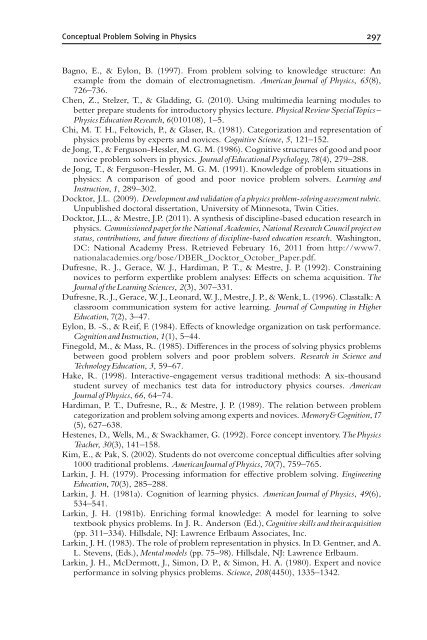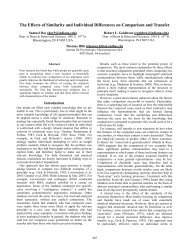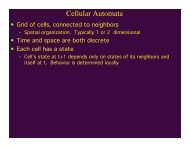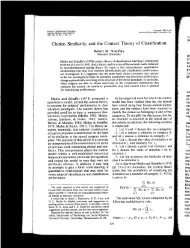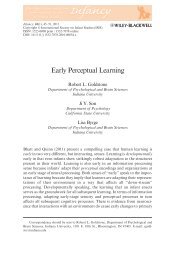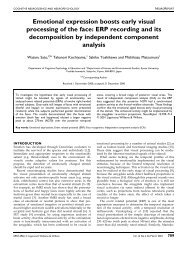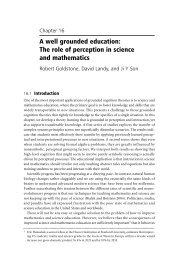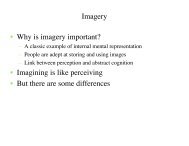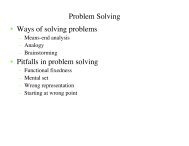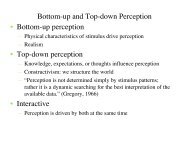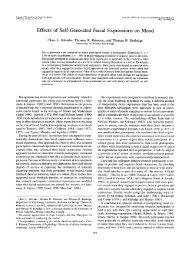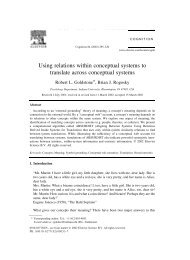Conceptual Problem Solving in Physics 297Bagno, E., & Eylon, B. (1997). From problem solving to knowledge structure: Anexample from <strong>the</strong> domain <strong>of</strong> electromagnetism. American Journal <strong>of</strong> Physics, 65(8),726–736.Chen, Z., Stelzer, T., & Gladding, G. (2010). Using multimedia <strong>learning</strong> modules tobetter prepare students for introductory physics lecture. PhysicalReviewSpecialTopics ^PhysicsEducationResearch, 6(010108), 1–5.Chi, M. T. H., Feltovich, P., & Glaser, R. (1981). Categorization <strong>and</strong> representation <strong>of</strong>physics problems by experts <strong>and</strong> novices. Cognitive Science, 5, 121–152.de Jong, T., & Ferguson-Hessler, M. G. M. (1986). Cognitive structures <strong>of</strong> good <strong>and</strong> poornovice problem solvers in physics. Journal<strong>of</strong>Educational Psychology, 78(4), 279–288.de Jong, T., & Ferguson-Hessler, M. G. M. (1991). Knowledge <strong>of</strong> problem situations inphysics: A comparison <strong>of</strong> good <strong>and</strong> poor novice problem solvers. Learning <strong>and</strong>Instruction, 1, 289–302.Docktor, J.L. (2009). Development <strong>and</strong> validation <strong>of</strong>a physics problem-solving assessmentrubric.Unpublished doctoral dissertation, University <strong>of</strong> Minnesota, Twin Cities.Docktor, J.L., & Mestre, J.P. (2011). A syn<strong>the</strong>sis <strong>of</strong> discipline-based education research inphysics. Commissioned paper for <strong>the</strong> National Academies, National Research Council project onstatus, contributions, <strong>and</strong> future directions <strong>of</strong> discipline-based education research. Washington,DC: National Academy Press. Retrieved February 16, 2011 from http://www7.nationalacademies.org/bose/DBER_Docktor_October_Paper.pdf.Dufresne, R. J., Gerace, W. J., Hardiman, P. T., & Mestre, J. P. (1992). Constrainingnovices to perform expertlike problem analyses: Effects on schema acquisition. TheJournal<strong>of</strong> <strong>the</strong>LearningSciences, 2(3), 307–331.Dufresne, R. J., Gerace, W. J., Leonard, W. J., Mestre, J. P., & Wenk, L. (1996). Classtalk: Aclassroom communication system for active <strong>learning</strong>. Journal <strong>of</strong> Computing in HigherEducation, 7(2), 3–47.Eylon, B. -S., & Reif, F. (1984). Effects <strong>of</strong> knowledge organization on task performance.Cognition<strong>and</strong>Instruction, 1(1), 5–44.Finegold, M., & Mass, R. (1985). Differences in <strong>the</strong> process <strong>of</strong> solving physics problemsbetween good problem solvers <strong>and</strong> poor problem solvers. Research in Science <strong>and</strong>TechnologyEducation, 3, 59–67.Hake, R. (1998). Interactive-engagement versus traditional methods: A six-thous<strong>and</strong>student survey <strong>of</strong> mechanics test data for introductory physics courses. AmericanJournal<strong>of</strong>Physics, 66, 64–74.Hardiman, P. T., Dufresne, R., & Mestre, J. P. (1989). The relation between problemcategorization <strong>and</strong> problem solving among experts <strong>and</strong> novices. Memory&Cognition,17(5), 627–638.Hestenes, D., Wells, M., & Swackhamer, G. (1992). Force concept inventory.ThePhysicsTeacher, 30(3), 141–158.Kim, E., & Pak, S. (2002). Students do not overcome conceptual difficulties after solving1000 traditional problems. AmericanJournal<strong>of</strong>Physics, 70(7), 759–765.Larkin, J. H. (1979). Processing information for effective problem solving. EngineeringEducation, 70(3), 285–288.Larkin, J. H. (1981a). Cognition <strong>of</strong> <strong>learning</strong> physics. American Journal <strong>of</strong> Physics, 49(6),534–541.Larkin, J. H. (1981b). Enriching formal knowledge: A model for <strong>learning</strong> to solvetextbook physics problems. In J. R. Anderson (Ed.), Cognitive skills<strong>and</strong> <strong>the</strong>iracquisition(pp. 311–334). Hillsdale, NJ: Lawrence Erlbaum Associates, Inc.Larkin, J. H. (1983). The role <strong>of</strong> problem representation in physics. In D. Gentner, <strong>and</strong> A.L. Stevens, (Eds.), Mentalmodels (pp. 75–98). Hillsdale, NJ: Lawrence Erlbaum.Larkin, J. H., McDermott, J., Simon, D. P., & Simon, H. A. (1980). Expert <strong>and</strong> noviceperformance in solving physics problems. Science, 208(4450), 1335–1342.
298 Jose P. Mestre et al.Larkin, J. H., & Reif, F. (1979). Underst<strong>and</strong>ing <strong>and</strong> teaching problem solving in physics.EuropeanJournal<strong>of</strong>Science Education, 1(2), 191–203.Leonard, W. J., Dufresne, R. J., & Mestre, J. P. (1996). Using qualitative problem-solvingstrategies to highlight <strong>the</strong> role <strong>of</strong> conceptual knowledge in solving problems. AmericanJournal<strong>of</strong> Physics, 64(12), 1495–1503.Mazur, E. (1997). Peer instruction:A user’smanual. Upper Saddle River, NJ: Prentice Hall.Mestre, J. P., Dufresne, R. J., Gerace, W. J., Hardiman, P. T., & Touger, J. S. (1993).Promoting skilled problem-solving behavior among beginning physics students.Journal<strong>of</strong> ResearchinScienceTeaching, 30(3), 307–317.Newell, A., & Simon, H. A. (1972). Human problem solving. Englewood Cliffs, NJ:Prentice-Hall, Inc.Novak,G.,Patterson,E.,Gavrin,A.,&Christian,W.(1999).Just-in-time teaching:Blending active <strong>learning</strong> with web technology. Upper Saddle River, NJ: Prentice Hall.Priest, A. G., & Lindsay, R. O. (1992). New light on novice-expert differences in physicsproblems solving. BritishJournal<strong>of</strong>Psychology, 83(3), 389–405.Reif, F., & Heller, J. I. (1982). Knowledge structure <strong>and</strong> problem solving in physics.Educational Psychologist, 17(2), 102–127.Savelsbergh, E. R., de Jong, T., & Ferguson-Hessler, M. G. M. (2002). Situationalknowledge in physics: <strong>the</strong> case <strong>of</strong> electrodynamics. Journal <strong>of</strong> Research in ScienceTeaching, 39(10), 928–951.Simon, D. P., & Simon, H. A. (1978). Individual differences in solving physics problems.In R. S. Siegler (Ed.), Children’s thinking:What develops? (pp. 325–361). Hillsdale, NJ:Erlbaum.Smith, A. D., Mestre, J. P., & Ross, B. H. (2010). Eye-gaze patterns as students studyworked-out examples in mechanics. Physical Review SpecialTopicsçPhysics EducationResearch, 6(020118), 1–9.Sokol<strong>of</strong>f, D. R., & Thornton, R. K. (2004). Interactivelecture demonstrations, active<strong>learning</strong>inintroductory physics. Hoboken, NJ: John Wiley & Sons, Inc.Stelzer, T., Brookes, D., Gladding, G., & Mestre, J. (2010). Impact <strong>of</strong> multimedia <strong>learning</strong>modules on an introductory course on electricity <strong>and</strong> magnetism. AmericanJournal <strong>of</strong>Physics, 78, 755–759.Stelzer, T., Gladding, G., Mestre, J., & Brookes, D. (2009). Comparing <strong>the</strong> efficacy <strong>of</strong>multimedia modules with traditional textbooks for <strong>learning</strong> introductory physicscontent. AmericanJournal<strong>of</strong>Physics, 77, 184–189.Thornton, R. K., & Sokol<strong>of</strong>f, D. R. (1998). Assessing student <strong>learning</strong> <strong>of</strong> Newton’slaws:The force <strong>and</strong> motion conceptual evaluation <strong>and</strong> <strong>the</strong> evaluation <strong>of</strong> active <strong>learning</strong>laboratory <strong>and</strong> lecture curricula. AmericanJournal <strong>of</strong>Physics, 66(4), 338–352.Tuminaro, J., & Redish, E. F. (2007). Elements <strong>of</strong> a cognitive model <strong>of</strong> physics problemsolving: Epistemic games. Physical Review SpecialTopicsçPhysics Education Research, 3(020101), 1–22.Walsh, L. N., Howard, R. G., & Bowe, B. (2007). Phenomenographic study <strong>of</strong>students’ problem solving approaches in physics. Physical Review Special TopicsçPhysics Education Research, 3(020108), 1–12.White, S., & Tesfaye, C.L. (2010). Who teaches high school physics? Results from <strong>the</strong>2008-2009 nationwide survey <strong>of</strong> high school physics teachers. College Park, MD:American Institute <strong>of</strong> Physics. Retrieved February 15, 2011, from http://www.aip.org/statistics/trends/reports/hsteachers.pdf.
- Page 3 and 4:
Series EditorBRIAN H. ROSSBeckman I
- Page 5 and 6:
Academic Press is an imprint of Els
- Page 7 and 8:
viContents3. Science of Multimedia
- Page 9 and 10:
This Page Intentionally Left Blank
- Page 11 and 12:
xContributorsHenry L. Roediger, III
- Page 13 and 14:
xiiPrefaceand there has been much e
- Page 15 and 16:
xivPrefaceInterventions for improvi
- Page 17 and 18:
2 Henry L. Roediger et al.delayed t
- Page 19 and 20:
4 Henry L. Roediger et al.an indire
- Page 21 and 22:
6 Henry L. Roediger et al.[(Figure_
- Page 23 and 24:
8 Henry L. Roediger et al.[(Figure_
- Page 25 and 26:
10 Henry L. Roediger et al.seems so
- Page 27 and 28:
12 Henry L. Roediger et al.interpre
- Page 29 and 30:
14 Henry L. Roediger et al.Table 2
- Page 31 and 32:
16 Henry L. Roediger et al.improved
- Page 33 and 34:
18 Henry L. Roediger et al.this mat
- Page 35 and 36:
20 Henry L. Roediger et al.length o
- Page 37 and 38:
22 Henry L. Roediger et al.9. BENEF
- Page 39 and 40:
24 Henry L. Roediger et al.subjects
- Page 41 and 42:
26 Henry L. Roediger et al.feedback
- Page 43 and 44:
28 Henry L. Roediger et al.supporti
- Page 45 and 46:
30 Henry L. Roediger et al.of some
- Page 47 and 48:
32 Henry L. Roediger et al.Benefit
- Page 49 and 50:
34 Henry L. Roediger et al.Hasher,
- Page 51 and 52:
36 Henry L. Roediger et al.Son, L.
- Page 53 and 54:
38 John Sweller1. INTRODUCTIONCogni
- Page 55 and 56:
40 John Sweller‘‘baby-talk.’
- Page 57 and 58:
42 John Swellerof cognitive or meta
- Page 59 and 60:
44 John SwellerTable 1Natural Infor
- Page 61 and 62:
46 John Swellerconfigurations. A ch
- Page 63 and 64:
48 John Swellerreproduction results
- Page 65 and 66:
50 John Swellerto mutation, without
- Page 67 and 68:
52 John Swellerusing a complex or,
- Page 69 and 70:
54 John SwellerThe human cognitive
- Page 71 and 72:
56 John Swellerepigenetic system ha
- Page 73 and 74:
58 John SwellerWe can determine lev
- Page 75 and 76:
60 John Swellerthan memorizing the
- Page 77 and 78:
62 John SwellerTable 2EffectVariabi
- Page 79 and 80:
64 John Swelleroccurs when students
- Page 81 and 82:
66 John Sweller3.3.3. The Split-Att
- Page 83 and 84:
68 John Swellermerely restates the
- Page 85 and 86:
70 John SwellerThe expertise revers
- Page 87 and 88:
72 John Swellerobtained a reverse m
- Page 89 and 90:
74 John Swelleractivities that othe
- Page 91 and 92:
76 John SwellerRenkl, A. (2005). Th
- Page 93 and 94:
78 Richard E. Mayercognitive theory
- Page 95 and 96:
80 Richard E. Mayerpictures beginni
- Page 97 and 98:
82 Richard E. MayerThe dualchannelp
- Page 99 and 100:
84 Richard E. Mayerlearner selects
- Page 101 and 102:
86 Richard E. MayerRosenthal, Rosno
- Page 103 and 104:
88 Richard E. MayerGenerative proce
- Page 105 and 106:
90 Richard E. Mayer4.2. Evidence-ba
- Page 107 and 108:
92 Richard E. Mayersituation could
- Page 109 and 110:
94 Richard E. Mayer(Moreno & Mayer,
- Page 111 and 112:
96 Richard E. Mayer4.3.1. Segmentin
- Page 113 and 114:
98 Richard E. Mayerpresenting the w
- Page 115 and 116:
100 Richard E. MayerThe multimedia
- Page 117 and 118:
102 Richard E. Mayergame in industr
- Page 119 and 120:
104 Richard E. MayerClark, R. C., &
- Page 121 and 122:
106 Richard E. MayerMayer, R. E., &
- Page 123 and 124:
108 Richard E. MayerSweller, J. (19
- Page 125:
110 Timothy J. Nokes and Daniel M.
- Page 128 and 129:
Incorporating Motivation into a The
- Page 130 and 131:
Incorporating Motivation into a The
- Page 132 and 133:
Incorporating Motivation into a The
- Page 134 and 135:
Incorporating Motivation into a The
- Page 136 and 137:
Incorporating Motivation into a The
- Page 138 and 139:
Incorporating Motivation into a The
- Page 140 and 141:
Incorporating Motivation into a The
- Page 142 and 143:
Incorporating Motivation into a The
- Page 144 and 145:
Incorporating Motivation into a The
- Page 146 and 147:
Incorporating Motivation into a The
- Page 148 and 149:
Incorporating Motivation into a The
- Page 150 and 151:
Incorporating Motivation into a The
- Page 152 and 153:
CHAPTERFIVEOn the Interplay of Emot
- Page 154 and 155:
Implications for Enhancing Academic
- Page 156 and 157:
Implications for Enhancing Academic
- Page 158 and 159:
Implications for Enhancing Academic
- Page 160 and 161:
Implications for Enhancing Academic
- Page 162 and 163:
Implications for Enhancing Academic
- Page 164 and 165:
Implications for Enhancing Academic
- Page 166 and 167:
Implications for Enhancing Academic
- Page 168 and 169:
Implications for Enhancing Academic
- Page 170 and 171:
Implications for Enhancing Academic
- Page 172 and 173:
Implications for Enhancing Academic
- Page 174 and 175:
Implications for Enhancing Academic
- Page 176 and 177:
Implications for Enhancing Academic
- Page 178 and 179:
Implications for Enhancing Academic
- Page 180 and 181:
Implications for Enhancing Academic
- Page 182 and 183:
Implications for Enhancing Academic
- Page 184 and 185:
Implications for Enhancing Academic
- Page 186 and 187:
CHAPTERSIXThere Is Nothing So Pract
- Page 188 and 189:
There Is Nothing So Practical as a
- Page 190 and 191:
There Is Nothing So Practical as a
- Page 192 and 193:
There Is Nothing So Practical as a
- Page 194 and 195:
There Is Nothing So Practical as a
- Page 196 and 197:
There Is Nothing So Practical as a
- Page 198 and 199:
There Is Nothing So Practical as a
- Page 200 and 201:
There Is Nothing So Practical as a
- Page 202 and 203:
There Is Nothing So Practical as a
- Page 204 and 205:
There Is Nothing So Practical as a
- Page 206 and 207:
There Is Nothing So Practical as a
- Page 208 and 209:
There Is Nothing So Practical as a
- Page 210 and 211:
There Is Nothing So Practical as a
- Page 212 and 213:
There Is Nothing So Practical as a
- Page 214 and 215:
CHAPTERSEVENThe Power of Comparison
- Page 216 and 217:
The Power of Comparison in Learning
- Page 218 and 219:
The Power of Comparison in Learning
- Page 220 and 221:
The Power of Comparison in Learning
- Page 222 and 223:
The Power of Comparison in Learning
- Page 224 and 225:
The Power of Comparison in Learning
- Page 226 and 227:
The Power of Comparison in Learning
- Page 228 and 229:
The Power of Comparison in Learning
- Page 230 and 231:
The Power of Comparison in Learning
- Page 232 and 233:
The Power of Comparison in Learning
- Page 234 and 235:
The Power of Comparison in Learning
- Page 236 and 237:
The Power of Comparison in Learning
- Page 238 and 239:
The Power of Comparison in Learning
- Page 240 and 241:
The Power of Comparison in Learning
- Page 242 and 243:
CHAPTEREIGHTThe Ubiquitous Patterns
- Page 244 and 245:
The Ubiquitous Patterns of Incorrec
- Page 246 and 247:
The Ubiquitous Patterns of Incorrec
- Page 248 and 249:
The Ubiquitous Patterns of Incorrec
- Page 250 and 251:
The Ubiquitous Patterns of Incorrec
- Page 252 and 253:
The Ubiquitous Patterns of Incorrec
- Page 254 and 255:
The Ubiquitous Patterns of Incorrec
- Page 256 and 257:
The Ubiquitous Patterns of Incorrec
- Page 258 and 259:
The Ubiquitous Patterns of Incorrec
- Page 260 and 261:
The Ubiquitous Patterns of Incorrec
- Page 262 and 263: The Ubiquitous Patterns of Incorrec
- Page 264 and 265: The Ubiquitous Patterns of Incorrec
- Page 266 and 267: The Ubiquitous Patterns of Incorrec
- Page 268 and 269: The Ubiquitous Patterns of Incorrec
- Page 270 and 271: The Ubiquitous Patterns of Incorrec
- Page 272 and 273: The Ubiquitous Patterns of Incorrec
- Page 274 and 275: The Ubiquitous Patterns of Incorrec
- Page 276 and 277: The Ubiquitous Patterns of Incorrec
- Page 278 and 279: The Ubiquitous Patterns of Incorrec
- Page 280 and 281: The Ubiquitous Patterns of Incorrec
- Page 282 and 283: The Ubiquitous Patterns of Incorrec
- Page 284 and 285: CHAPTERNINEConceptual Problem Solvi
- Page 286 and 287: Conceptual Problem Solving in Physi
- Page 288 and 289: Conceptual Problem Solving in Physi
- Page 290 and 291: Conceptual Problem Solving in Physi
- Page 292 and 293: Conceptual Problem Solving in Physi
- Page 294 and 295: Conceptual Problem Solving in Physi
- Page 296 and 297: Conceptual Problem Solving in Physi
- Page 298 and 299: Conceptual Problem Solving in Physi
- Page 300 and 301: Conceptual Problem Solving in Physi
- Page 302 and 303: Conceptual Problem Solving in Physi
- Page 304 and 305: Conceptual Problem Solving in Physi
- Page 306 and 307: Conceptual Problem Solving in Physi
- Page 308 and 309: Conceptual Problem Solving in Physi
- Page 310 and 311: Conceptual Problem Solving in Physi
- Page 314 and 315: IndexAAcademic performancedrive the
- Page 316 and 317: Index 301Correct method comparison,
- Page 318 and 319: Index 303LLabor in vain, 28Language
- Page 320 and 321: Index 305OOntological categories of
- Page 322 and 323: Index 307WWeb-delivered multimedia
- Page 324 and 325: CONTENTS OF RECENT VOLUMESVolume 40
- Page 326 and 327: Contents of Recent Volumes 311Under
- Page 328 and 329: Contents of Recent Volumes 313Volum


